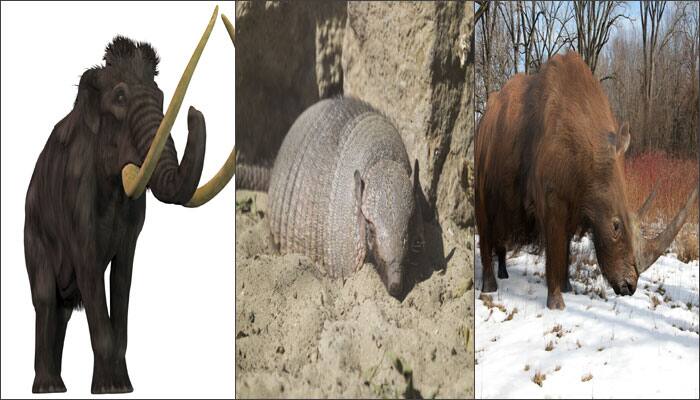London: Early humans, not climate change, were the dominant cause of the extinction of a variety of species of giant beasts, new research has revealed.
The research seeks to end the prolonged debate over whether mankind or climate change was the dominant cause of the demise of massive creatures in the time of the sabretooth tiger, the woolly mammoth, the woolly rhino and the giant armadillo.
Known collectively as megafauna, most of the largest mammals ever to roam the earth were wiped out over the last 80,000 years, and were all extinct by 10,000 years ago.
"As far as we are concerned, this research is the nail in the coffin of this 50-year debate -- humans were the dominant cause of the extinction of megafauna,” said lead researcher Lewis Bartlett, researcher from University of Exeter in England.
Cutting-edge statistical analysis had helped solve the mystery almost beyond dispute, concluding that man was the dominant force in wiping out the creatures, although climate change could also have played a lesser role, Bartlett noted.
The researchers ran thousands of scenarios which mapped the windows of time in which each species is known to have become extinct, and humans are known to have arrived on different continents or islands.
This was compared against climate reconstructions for the last 90,000 years.
Examining different regions of the world across these scenarios, they found coincidences of human spread and species extinction which illustrate that man was the main agent causing the demise, with climate change exacerbating the number of extinctions.
"What we don't know is what it was about these early settlers that caused this demise. Were they killing them for food, was it early use of fire or were they driven out of their habitats,” Bartlett said.
"Our analysis doesn't differentiate, but we can say that it was caused by human activity more than by climate change. It debunks the myth of early humans living in harmony with nature," Bartlett noted.
However, in certain regions of the world - mainly in Asia - they found patterns which were broadly unaccounted for by either of these two drivers, and called for renewed focus on these neglected areas for further study.
The findings were detailed in the journal Ecography.
















